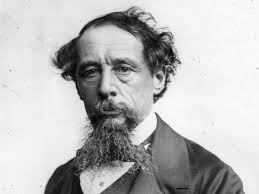As part of my researches into my great-great-grandad George Matcham Pitt, I was scrolling through Trove looking for information on an Aboriginal man named ‘Fryingpan’ – who had been accused and convicted of spearing a cow on my ancestor’s property on the Gwydir – when I came upon what looked like a first-hand account of the trial written by none other than Charles Dickens.

Wow, I thought, what a coup. What family historian isn’t thrilled at the thought of direct connections with famous people?
The trial took place at Maitland Assizes in 1842. To be precise, the only man tried that day – for some reason the writer wasn’t aware of, Fryingpan, while in court, did not enter the dock – was Fryingpan’s friend The Duke of Wellington (these monikers presumably bestowed on them by convicts), also accused of spearing a cow. The writer gave a vivid description of the defendant with his ‘coarse-matted’ shoulder-length hair, bright expressive eyes and a mouth ‘enough for two faces’. It took some pushing and shoving to get him into the dock apparently, and then, the writer went on:
‘When fairly confronted with Sir James [the judge], a violent grin broke out half-round Wellington’s head, evidently caused by his Honor’s wig, bands, and red gown, on which the savage’s eyes seemed to be fastened with a fascinated stare. Nor did he, in his unsophisticated nature, attempt to conceal the emotion excited within him; for, notwithstanding the additional gravity laid on by the judge for the occasion, the joke appeared to improve so much in the black man’s mind that at last he laughed outright. Moreover he seemed to grin a kind of circular invitation to all the people in Court to join in the laugh with him. He grinned the rebukeful countenance of the Sheriff into such a state, that that solemn officer of justice was obliged to turn his face away, and discharge a short private laugh of his own. He grinned at the counsel and the crowd, until giggling became irrepressible, and even the countenance of the Chief Justice, who had a keen perception of the ludicrous, was becoming rapidly unmanageable.’
Eventually things calmed down and the trial was under way. Wellington, through an interpreter, claimed the evidence against him was ‘a pack of lies’, but unfortunately his plea was contradicted by several witnesses and he was found guilty and transported for ten years to Van Diemen’s Land. He was led from the court still grinning, ‘as if he had got to the end of a pleasant entertainment’.
The writer, while enjoying the spectacle, and disregarding his use of the word ‘savage’, was on reflection appalled and dismayed. What right do we have, he wrote, to submit ‘this poor child of nature’ to ‘an English court of justice, mock his ignorance with a jargon of law forms, and conclude by tearing him from his hunting grounds, his wife, and little children, for ten years?’
The tone of the piece, the humour and the empathy and understanding of what it meant for an Aboriginal man to be stripped of everything he had ever known, sounded pure Dickens to me. The Trove article appeared in the Wingham Chronicle and Manning River Observer in 5th September 1919, and clearly the newspaper thought the same. It didn’t take me long however to discover that Dickens himself never actually visited Australia, even though it featured in several of his books in one way or another, and he sent two of his sons there (about whom more at another time). The original article, Going Circuit at the Antipodes, appeared in Household Words – which called itself a Journal ‘conducted’ by Dickens – in 1852, and like all the other contributions, there was no author credited.

So who was the mystery writer?
A bit more research turned up a book compiled by a Canadian writer called Anne Lohri (available in the fabulous British Library), in which she lists all the contributors to Household Words . It transpired the writer was a “London barrister” and part-time journalist called Archibald Michie, who’d arrived in Sydney a few years earlier and had been invited to attend the court by an Australian lawyer friend.
Anti-climax? Well yes and no. The fact that the writer was not Dickens does not make it any less noteworthy as an account, by an outsider, of how colonial law dealt with Aboriginal wrongdoers. And anyway, Dickens thought nothing apparently of taking a story sent to him and ‘playing with it until it was practically rewritten’ (according to Coral Lansbury, JRAHS, Vol 52 part 2, 1966).
The one thing it does do is throw up the pros and cons of trying to write a book about family history: getting sidetracked by famous people makes the exercise both all the more fascinating and all the more endless. Publication date? Don’t mention it.
Patsy Trench, London, June 2017
